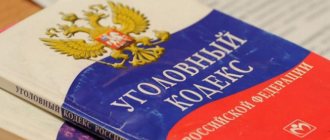The Criminal Code of the Russian Federation qualifies fraud as theft or acquisition of rights to someone else's property, committed by deception or abuse of trust.
What articles regulate fraud? Attempted fraud is regulated by two articles of the Criminal Code of the Russian Federation - Article 159 “Fraud” and Art. 30 “Preparation for a crime and attempted crime.”
Other types of fraud
Offenses in the insurance industry and Internet fraud are identified as separate types of fraud. Article 159 of the Criminal Code of the Russian Federation, or rather its 5th and 6th parts, regulate the composition of crimes and punishment for them. If a person lies about the occurrence of an insurance event in order to receive a particularly large payment from the insurance company, he will face trial and imprisonment for up to 5 years. Theft of someone else's property or rights to property by hacking, blocking or changing computer protection will be punished taking into account the size of the theft, as well as mitigating or aggravating circumstances.
It should be noted that along with the changes and improvements in Criminal proceedings, in 2012 changes were made to the Civil and Administrative Code. According to the new rules, criminals will be punished for petty fraud, according to the Civil Procedure Code.
Often the areas of criminal and civil law overlap. For example, in parallel with the criminal investigation of fraud, it may be established that the victim was also subjected to threats, blackmail, slander or personal insult. In this case, Article 159 of the Criminal Code of the Russian Federation will establish only part of the punishment, and the final court decision and the penalty will be established after considering the entire case as a whole.
Most often, court decisions are made taking into account all additional factors in the case, namely the physical and mental health of the attacker, whether he has accomplices, his age, the financial well-being of the parties to the conflict, etc.
For false accusations of fraud, Russians face criminal liability, so before contacting the police with a petition, it is necessary to collect documentary evidence of the offense.
When there is no criminal penalty for attempted fraud
An attacker will not be held criminally liable for attempted fraud if he himself has decided to stop illegal actions. Frauds whose purpose was to steal an amount of less than 2,500 rubles do not fall under criminal liability. In such a case, administrative measures will be applied.
The Criminal Code of the Russian Federation qualifies fraud as theft or acquisition of rights to someone else's property, committed by deception or abuse of trust.
Expert opinion
Mikhailov Igor Konstantinovich
Legal consultant with 10 years of experience. Specializes in the field of civil law. Has experience in document examination.
What articles regulate fraud? Attempted fraud is regulated by two articles of the Criminal Code of the Russian Federation - Article 159 “Fraud” and Art. 30 “Preparation for a crime and attempted crime.”
- What is assassination attempt?
- And now specifically, what is attempted fraud?
- Examples
- With insurance
- With loans
- With benefits or social payments
- When does one qualify?
- Corpus delicti
- Responsibility under Articles 159 and 66 of the Criminal Code of the Russian Federation
- The concept of “unfit” attempt within the framework of the Criminal Code of the Russian Federation
Where and how to apply if a crime has been detected
- In order for the offenders to be checked, it is necessary to file a fraud report with the police. The application in this case will be the basis for an inspection. If a crime is discovered, a criminal case is initiated. After acceptance of the application, a coupon is issued, which indicates the individual number, time of acceptance of the application and information about the official who accepted it. The application can also be accepted orally. In this case, it is recorded through the protocol.
- If the officer on duty refused to accept the application, the applicant may contact the prosecutor's office.
- After the inspection, the application and all materials on the case are transferred to the prosecutor's office. The investigator collects materials on the case, investigates the crime and submits the materials to the court.
- If a decision has been received from the prosecutor’s office refusing to initiate a criminal case, the applicant can contact the head of the investigator who refused to initiate you or go to the Prosecutor General’s Office (you can also use their website https://www.genproc.gov.ru/)
The following bodies are involved in investigating crimes and punishing criminals:
- The police are investigating. A criminal case is initiated, facts are collected, the identities of the criminals are established, investigative interrogations are conducted and witnesses to the incident are brought in.
- The prosecutor's office determines the degree of guilt of the violators in accordance with the norms of the law.
- The court pronounces a sentence and monitors its implementation.
What to include in the application?
- The header indicates the authority where the application is submitted and the applicant’s personal data, including passport details, place of registration and contacts.
- A statement of the event that occurred, a description of the actions performed by all persons involved in the situation.
- Please initiate a criminal case against the offender under Article 159 of the Criminal Code of the Russian Federation.
- Date and personal signature of the applicant.
- statements to the police about fraud
- statements to the police about fraud
Evidence, if any, must be attached to the application. The application itself contains a list of attached evidence. If there are witnesses, their names and place of residence, if known, must be provided.
Legal settlement
First, law enforcement agencies investigate such cases. Based on the application, a preliminary check is carried out, after which a decision is made to initiate criminal proceedings or refuse to do so. The preliminary investigation can last from 2 to 6 months. In some cases, the investigation can drag on for years. What is checked:
- What happened.
- In what circumstances, are there any mitigating circumstances.
- Amount of damage.
- Fact of fraud.
When the investigation is completed, a report is drawn up, after which the case is transferred to the prosecutor's office and then to the court. If the investigation recognizes the citizen as a victim, the claim is filed in court without a fee.
The court verdict is based on the evidence that was considered during the hearing. It can be accusatory or acquittal.
What to use as evidence?
In order to bring the attacker to justice, the injured party must collect evidence of his illegal actions. The following may serve as evidence:
- Receipts for receipt of funds.
- Letters containing references to the transaction that took place.
- An agreement by which the parties sealed their deal.
- Photographic materials.
- Video materials.
- Receipts, payment orders, checks and other financial documents.
- Witness's testimonies.
Thus, it is understood as the theft of someone else's property by deception or abuse of the victim's trust. The degree of fraud is determined by the amount to which the property received is equivalent. The sanctions that apply to the fraudster depend on the degree that will be awarded to the crime committed.
Attempted fraud can also lead to criminal liability. To bring the perpetrator to justice, you must file a police report. Evidence of the theft must be attached to the application.
To solve your problem RIGHT NOW get a free LEGAL consultation Moscow
Penalties
Criminal liability measures for attempted fraud are provided based on the main article, i.e., for committing fraud (Article 159 of the Criminal Code), but are mitigated based on Art. 66 of the Criminal Code. To put it simply, the punishment is equal to ¾ of the maximum penalty.
The article for attempted fraud involves penalties that directly depend on the size of the alleged theft:
| Degree of responsibility | For attempted fraud on a large scale | For attempted fraud on an especially large scale |
| minimum | minimum | fine up to 750 thousand rubles |
| maximum | imprisonment for 4.5 years | imprisonment for 7.5 years |
If we consider the earlier example of attempted fraud, Mr. And in relation to gr. V., then the maximum punishment that gr. A, is 7.5 years in prison and a fine of 750 thousand rubles.
Fraud is the unlawful taking of another person's property through deception or breach of trust. It differs from theft in that the victim independently gives the property or the right to it to the criminal.
There are a number of situations when, due to circumstances, the attacker was unable to complete the scam he started. In this case, his actions will be qualified from a legal point of view as unfinished, and punishment will be imposed for attempted fraud.
The sanction for attempted fraud is regulated by Article 159 of the Criminal Code of the Russian Federation.
Attempted fraud as understood by the legislator
It is important to learn to distinguish between crimes such as fraud and theft. In essence, they are the same: taking possession of someone else’s property
However, they differ in the method of execution. The fraudulent method involves the use of deception or special trust on the part of the victim.
Criminal law provides for the punishment of violators not only for a fully committed and completed crime, but also for an unfinished act - attempted fraud or attempt.
In this area, it is important to distinguish which criminal acts can be considered an attempt:
- Only unfinished ones are those criminal actions that are not completed.
- Those actions that carried an evil, directed intent, but were not completed for reasons beyond the control of the actor.
It is important to understand that if the criminal did not complete his illegal intentions of his own free will (refused to commit an illegal act), this will not be considered an attempt.
Article of the Criminal Code on attempted fraud
According to the provisions of the Criminal Code, an attempt to commit a crime, in particular fraud, is an action that meets 3 basic conditions:
- these actions (or inaction) of the attacker must be aimed at achieving a criminal goal - taking possession of the victim’s property;
- the acts or omissions must be intentional;
- actions are not brought to their logical conclusion due to circumstances beyond the control of the criminal. Situations in which the attacker himself refused to complete the criminal plan do not contain corpus delicti and therefore cannot be qualified as attempted fraud.
An attempted fraud involves two stages. Let's analyze each of them.
Preparation to commit a criminal act
This stage consists of developing a crime plan and creating conditions for its implementation. Proving a crime at this stage is very difficult, and often impossible.
For example, citizen A. planned to fraudulently take possession of an apartment in which he only owned half. The other part is owned by his brother V. The attacker is working on a crime scheme. He plans to promise his brother a decent reward for his share of the apartment, but ultimately fails to pay. It is impossible to prove the guilt of a potential fraudster at this stage.
Attempted crime
That is, taking actions to achieve the goal - taking possession of property.
Be careful!
Fraudsters often operate using easy payment services from telephone operators. They contact the subscriber on behalf of the company and report hacking or communication problems. Do not be gullible and do not give your personal data or other information to strangers! Read more here
Let's continue the previous example: attacker A. begins to prepare documents for the procedure of donating a share in the apartment. It is in this way, through donation, that he plans to take possession of his brother’s property. He is going to promise the reward verbally. When everything is already prepared, the attacker reveals his plan to a mutual acquaintance of his brother and him. He tells the potential victim about the planned crime. Citizen V. files a complaint with the police.
There is evidence of a crime: attempted fraud, which threatened to deprive the victim of his rights to residential premises. This act, in accordance with Art. 159 of the Criminal Code, paragraph 4, is equated to fraud on an especially large scale.
Types of fraud schemes
The types of fraud are endless, but the most common from antiquity to the present day are two types:
- Quick withdrawal of money. The scheme for quickly withdrawing funds from the population, most often, involves verbal deception of the victim, removing him from a state of emotional balance and bringing him to a state where the person cannot adequately react and reason sensibly. After which the scammer forces the victim to trust him and give a certain amount of money or a valuable item. Sometimes the criminal has accomplices who push the victim to part with material values.
- Scams aimed at big profits. To obtain substantial sums, scammers usually develop a thorough plan; the preparation lasts quite a long time, sometimes for years. The scammers themselves, as a rule, work in the same or related areas of economic activity. The winnings can more than repay the time and effort spent.
There are other types. For example, long-term processing of an object of deception in order to make a small profit, or hasty, unprepared attacks on an entire organization with a counteraction system. They are rare.
New types of scams appear almost every day. Most of them are related to modern communication technologies - fraud by phone, with plastic cards, via the Internet. An SMS asking you to send a reply message or a dropped call from an unknown number - both can be bait to empty your account. The main thing to remember when an incomprehensible or unusual situation arises is not to believe the information received.
Ways to prove fraud
A fraud case will be considered as quickly as possible if there is documentary evidence of the crime. The Criminal Code provides for several options for evidence in the case. The most effective way would be to have a receipt confirming the receipt of funds on behalf of the fraudster. But not everything in life is always easy and simple. Quite often in legal practice there are cases when citizens are unable to prove a crime.
Then they need to resort to collecting evidence using technical means. Today, audio and video recordings, email correspondence, SMS messages, etc. can be used in court for fraud. The more evidence is presented, the greater the chances of winning the process and assigning a fair sentence to the criminal.
For the records to be legal and have legal significance, it is necessary that in them the attacker admits to having committed a crime, indicates the amount of the debt, requests for its return over a certain period, etc.
Correspondence and records must be transferred to paper and contain a transcript certified by a notary. If this evidence is not enough for the police to open criminal proceedings, the citizen can file a complaint directly with the prosecutor's office or court.
Proving fraud is very difficult. Only a lawyer can competently argue the plaintiff’s position and get the case considered. Independent attempts to resolve conflicts end negatively in 90% of cases.
Who can be held responsible for the crime
The subject of a crime is a person who intentionally committed an action or inaction that led to a violation of any laws.
Unlike many other crimes, Article 20 of the Criminal Code provides for liability for insurance fraud only after reaching the age of sixteen. If the subject of the crime during the investigation, as well as court proceedings, is not sixteen years old, the citizen is exempt from criminal liability even if guilt is proven.
The subjects of the crime can be:
- members of a group that committed illegal acts;
- members of criminal communities.
Violation of laws in the economic sphere does not have a maximum age limit, therefore people who have retired can also be held liable, including for fraud related to pension payments, which also fall specifically under Article 159.5 of the Criminal Code of the Russian Federation.
Definition of crime
When material assets or rights to them are stolen from other persons, such acts are classified as fraud.
Illegal actions of this nature, as well as attempted fraud, are regulated by Article 159 of the Criminal Code of the Russian Federation. A distinctive feature of fraud is the non-use of physical force or threats of harm to the health and life of the victim.
All actions of attackers are based on psychological influence and convincing the injured party to do the actions necessary for the fraudster. This is achieved by deceiving or abusing the trust of the victim. The subject of the crime may be a person who has reached the age of 16 at the time of the fraudulent activity.
An attacker, when committing fraud, acts out of direct selfish intent, pursuing his own selfish goals. An illegal act of the nature in question is considered committed at the moment when the fraudster has gained control over the victim’s material assets and can use them for his own purposes.
When dividing marital property
In the case when the relationship between the spouses deteriorates and they decide on divorce proceedings. The property that they have acquired over the years of family life can be divided at a court hearing.
During a divorce, all property and debt obligations that were formed during the existence of the marriage are divided. If there is no marriage agreement, then the division occurs on the 50/50 principle. Debts can be expressed in credit agreements, mortgages, money borrowed from relatives, friends and other persons.
A spouse who decides to increase the size of his share may commit fraud. It may look like this: he turns to the person from whom he allegedly borrowed money and asks to write a receipt. The document is presented at the court hearing.
The second party will have to pay half of the debt or give up part of the property to offset it. Fraud charges can be brought if a false receipt is submitted to the court. When during the meeting it turns out that the document is forged, the classification will be given as an attempt.
Special cases of assassination attempt
Fraud does not have a specific area of commission. It can occur in different areas of social relations.
Attacks may occur in the following areas:
- Insurance.
- Bank loans and lending.
- IT and computer technologies.
- Social payments.
- Internet payment systems and bank cards.
In addition to these general areas, there is also a private area of fraud, when illegal actions to obtain property are directed at a specific person.
Such examples occur in the following situations:
- Division of marital property during divorce.
- Value added tax refund.
- Insurance (in particular, motorist liability insurance).
Attempting fraud in these areas has its own characteristics.
Examples
Examples of attempted fraud are crimes in the areas of insurance, lending, social payments and benefits, the use of bank cards and computer technology.
With insurance
Fraudsters insured dummy residential buildings with the VSK insurance company. Later, they provided the insurance company with documents for payment of insurance in connection with the occurrence of an insured event - a fire.
Employees of the insurance company established that the houses were dummies, and the documents for the construction of houses were fake. Law enforcement agencies of the Vologda region opened a case against fraudsters for attempted fraud.
The crime was not completed, because employees of the insurance company established the fact that the houses were dummies and law enforcement officers detained the intruders. They did not take possession of the funds they hoped to obtain fraudulently, which means the crime is considered unfinished.
With loans
The borrower provides fictitious documents from the place of work. When checking these documents, the bank's security service determines their fictitiousness and transmits information about the borrower to law enforcement agencies.
Not only citizens with low social status resort to trying to get a loan using forged documents , but also legal entities who take out a loan secured by non-existent property or property at a significantly inflated value.
With benefits or social payments
Fraudsters, when committing crimes related to government payments, mistakenly believe that government agencies do not have the capabilities to examine all documents submitted for receiving benefits.
So, for example, documents may be submitted to the Pension Fund authorities to receive a survivor's pension for children who have been deprived of such a right by providing false certificates from educational institutions.
A Pension Fund employee, when making a request to an educational institution, detects the fact of falsification and transmits information about the attempted fraud to the Internal Affairs Directorate.
What is fraud
The legislation of the Russian Federation recognizes such a crime as any illegal seizure of someone else’s property for the purpose of profit. According to Article 159 of the Criminal Code of the Russian Federation, such an act can be committed in two ways.
Deception
It can be proven if:
- the victim was told information even though it was known in advance that it contained untruths;
- did not provide important data that could radically affect the transaction;
- an original item that has its own value was passed off as a counterfeit or information was falsified;
- any other actions were taken that could mislead the victim in order to commit the theft of his property.
In practice, there are cases where the accused did not realize that he was committing deception. Such an act is not criminal and is not punishable by law.
Breach of trust
There are a number of reasons that create a favorable environment for the implementation of a criminal plan or attempted fraud:
- the criminals are members of the victim’s inner circle, which is why the transaction is not documented, but is based on an oral agreement;
- a document has been signed assigning certain responsibilities to the parties to the transaction and allowing it to be considered safe;
- the attacker has a certain weight in society or significant material wealth, which creates the illusion of his reliability;
- an advance payment has been made for a product or service, which should guarantee a favorable outcome of the transaction.
In any of the above cases, fraud can be proven if it is completed and the victim loses his property. Otherwise, it can only be classified as unfinished.
Important! Fraud is one of those crimes that is not only difficult to prove, but also difficult to qualify. The victim cannot always figure out the situation on his own and turns to an experienced lawyer for help.
Characteristics of the crime
Attempted crime is described in Art. 30 of the Criminal Code of the Russian Federation. In the case of attempted fraud, Article 159 is always considered with Article 30 of the Criminal Code of the Russian Federation, this allows the punishment to be clearly individualized. An attempt can be carried out by not carrying out criminal plans to completion for reasons depending on the criminal, and for circumstances beyond his control.
Voluntary refusal to carry out illegal manipulations is not considered an attempt at fraud.
According to Art. 159 of the Criminal Code of the Russian Federation, attempted fraud has a number of characteristic features that allow it to be qualified. These include:
- Inability to collect a “solid” evidence base. Quite often, the court bases its decisions on audio recordings, videos and documents. The process of introducing such evidence in a fraud case is quite complex and not always possible.
- Attempt is quite difficult to prove. The fact is that every criminal, caught even red-handed, will claim that he himself voluntarily abandoned the commission of evil intentions, and was not forced by circumstances. It is difficult to prove otherwise, because the court evaluates any doubts about guilt in favor of the criminal.
- For a crime to be classified as attempted fraud, there must be malicious intent. In most cases, scams are carried out in the property sphere and the violators do not have malicious intent, because they are confident in the legality of their actions, and if there is no malicious intent, then the actions of the violator cannot be regarded as an attempt to commit a scam.
In order for an article of the Criminal Code to be charged with attempted fraud, there must be a corpus delicti where the objective side is the actions of the offender aimed at taking the victim’s property by deception, which are not brought to their logical conclusion. As mentioned above, the subjective side should be characterized by the direct intent of the fraudster.
The object of the crime is property relations. The subject of a criminal act is a sane person over 16 years of age.
In order for the criminal’s act to be regarded as an attempt at fraud, it is enough to stop at the stage of receiving someone else’s property.
For a clear example of an attempt at fraud, we can consider a situation in which Ivanov and Sidorov, using forged documents, took several boxes of expensive fertilizer from the plant. Initially, they were prosecuted under Article 159, but their actions were reclassified as an attempt to commit fraud under the Criminal Code of the Russian Federation.
The fact is that Ivanov himself, having loaded fertilizer into the car, was caught without leaving the plant, and his accomplice was waiting for him at another warehouse, but the car never reached him, because it was also detained. Accordingly, neither one nor the other had time to dispose of the stolen goods, because the crime was completed due to circumstances beyond their control.
Frequent areas of fraud
Fraud attempts are often identified by lawyers and law enforcement during the divorce process. Both spouses want to tear off a “bigger piece” of property and at the same time use illegal tricks and frauds.
Depending on the method of fraud chosen, the spouse’s actions may be classified as fraud or an attempt at it, or as forgery if he submits fictitious receipts or other official papers to the court in order to take possession of someone else’s property.
When refunding VAT, cases of scams are also not uncommon. For example, an attacker may submit a false declaration or other papers confirming that tax amounts have already been paid to the budget, although in fact the citizen was trying to avoid paying the tax.
The attacker may ask for a refund of the previously paid amount, but, in fact, there is nothing to return, because the tax was not paid.
If VAT is refunded, public funds are being stolen, and this can be regarded as fraud. The violator may also be charged with a combination of Articles 199 and 198 for tax evasion, as well as for illegal business activities.
If real damage to the state or individuals does not occur as a result of filing false documentation with the Tax Service, then the actions of the criminal are regarded as an attempt at fraud.
Insurance companies are often the injured party in attempted fraud cases. Criminals try to provoke a fictitious insurance claim in order to receive guaranteed monetary compensation.
The violator may, for example, submit a fictitious doctor's certificate in order to obtain insurance or provide more serious documents to obtain compensation. Depending on the type of document falsified, liability will arise - for attempted fraud or for forgery of documents.
Determination of the category of crime depending on the damage
To determine which category a crime should be classified into, it is necessary to assess the damage in material equivalent. The punishment will depend on this. Articles 159, 159.1 - 159.6 are devoted to this type of crime.
With a large
How much is this - a crime on a large scale? For crimes involving individuals, this means damage in an amount exceeding 250 thousand rubles. The exceptions are:
- If the violations were committed in the field of entrepreneurship (this is discussed in the sixth part), the large amount is equal to an amount of 3 million or more.
- In the field of lending and other crimes discussed in Articles 159.1 - 159.6, damage amounting to 1.5 million rubles is considered major.
With a particularly large
This means damage of 1 million rubles. The exceptions are:
- If the fraud occurred in the business sector (a similar violation is discussed in Part 7), a particularly large amount is equal to an amount of 12 million or more.
- The amount will be over 6 million if the fraud relates to the five areas covered in articles 159.1 - 159.6.
What to do if you are accused of attempted fraud
It’s one thing when you become a victim of scammers, but they did not have time to complete the matter and took possession of your property. Then you must definitely contact the police at your place of residence and report an attempt to commit a crime. Fraudsters will be convicted and given their due punishment. Often citizens are silent about such facts, because they did not suffer any damage, there is nothing to compensate or return.
The question looks completely different when you yourself are accused of such a crime. First you need to figure out what caused this state of affairs and try to prove your innocence. If the facts speak against you, then the first argument will be the unintentionality of the actions committed. The second is the lack of preparatory measures, without which the attempted crime could not have taken place.
Important! In any case, it will be difficult to prove your innocence. This will require a lot of effort and time, finding witnesses or evidence that you did not do anything criminal
In such a situation, it is best to contact a professional lawyer who will help you understand this difficult matter and advise you on how to proceed. This is the only way you can be sure of a favorable resolution of the issue.
ATTENTION! Due to recent changes in legislation, the information in this article may be out of date! Our lawyer will advise you free of charge - write in the form below. .
When does one qualify?
In order to recognize the actions of criminals as attempted fraud, it is enough that their actions were suspended at the stage of taking possession of someone else’s property, even before they have the opportunity to dispose of it.
Criminal actions of attackers must meet three criteria::
- The purpose of criminal acts or omissions is to seize the victim’s property.
- Actions or inactions must certainly be intentional and not accidental.
- The crime remained uncommitted due to circumstances beyond the control of the offender.
In situations where a person intentionally renounces a criminal act, there is no corpus delicti and they cannot be regarded as an attempt to commit fraudulent acts.
In the insurance industry
Also, qualified acts of fraud include acts committed in the area of activity of insurance companies. The policyholder contacts the organization providing this type of service by protecting the interests of individuals and legal entities upon the occurrence of a certain type of circumstances, which are called insured events.
Interests are protected through the operation of funds that have insurance value. They are formed as a result of the payment of premiums by the policyholder. Responsibility for fraud occurs if funds are stolen from the fund upon the occurrence of an insured event. Also, the subject in this case may be the amount of compensation to be paid.
In order to qualify the act as an attempt on the crime in question, the perpetrator must commit actions aimed at obtaining insurance compensation. Fraudsters use a method of deception. False documentation is submitted to the insurance company stating that an incident has occurred for which an appropriate payment is provided.
In the case where falsification of documentation is carried out by the same person, it is necessary to evaluate the act based on the totality of the offenses
Please note that this qualification only applies to attempted murder. When committing fraud, an assessment of forgery of documents is not required
This is due to the fact that the disposition of the article provides for the production of forged papers for use in a crime.
https://youtube.com/watch?v=Xoms-a7LvVY%3Ffeature%3Doembed







